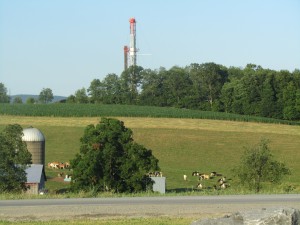Legislative Proposal Aims to Re-unite Landowners with Mineral Rights

Kim Paynter/ WHYY / WHYY/Newsworks.org
A drill rig rises above a farm in Northeastern Pennsylvania.org
Just as landowners across the state began to realize they were sitting on top of a lucrative slice of natural gas, some got a rude awakening.
It turns out a lot of Pennsylvania landowners don’t own the natural gas, oil, or any other minerals that may sit beneath their property. Somebody else does. In some cases, that somebody else is hard to determine. In other cases, the mineral rights owner has already cashed in, and leased their subsurface rights to a gas driller, unbeknownst to the surface owner.
Les Greevy is an attorney from Williamsport who handles real-estate transactions. His business has picked up as the shale gas boom leads more and more landowners to seek his help in figuring out complicated lease holdings.
“The surface owner is subservient to the subsurface owner,” says Greevy. “He’s the guy who bears the brunt of what happens and he doesn’t get any money.”
Last week, lawmakers in Harrisburg held a hearing over a new proposal that would make it easier for surface owners who don’t own their mineral rights to acquire them. The proposed law wouldn’t help the Hallowiches. But the bill’s proponents say it would help hundreds of other state residents – people who are unable to strike deals with gas drillers, or to prevent drilling operations on their property, because of confusion over who actually owns the rights to the natural gas sitting below their land.
And it may help others who are concerned that someone, somewhere, might one day strike a deal that puts drill rigs on their land without their approval and without any way of reaping a benefit.
Senate Bill 258, introduced by state Sen. Gene Yaw, R-Bradford County, would give landowners a legal leg up in acquiring the subsurface rights to their property if more than 50 years have passed without any activity to tap those resources. The landowner would still have to prove they conducted a diligent search for the original title holder.
Greevy, who testified last week in favor of SB 258, says he’s been involved in dozens of what lawyers refer to as “quiet title” actions, when surface owners try to gain the subsurface rights. Often it involves complicated detective work.
“Sometimes we do the search and we find people,” says Greevy. “And then it’s tough darts [for the surface owner], because typically [the subsurface owner] never knew they had them. So they’re smiling, and the landowner is praying in his beer.”
Often, he says, the mineral rights are divided among dozens of people scattered all over the country.
“There are two different scenarios here,” says Greevy. “You got the normal mom and pop farmer folks who don’t have their rights.” Greevy says SB 258 is designed to help them.
Another scenario, Greevy says, involves lumber companies that operated back at the turn of the century. These companies often sold off their surface rights, but kept the mineral rights to thousands of acres spread beneath dozens, or perhaps hundreds, of current landowners.
“Those are quiet title actions on steroids,” says Greevy.
Greevy says SB 258 won’t affect those cases. But, in the cases of small landowners who use “quiet title” to reconnect their surface and mineral rights, it could help “give gas companies the certainty they need in order to lease.”
But gas drillers have mixed reviews of SB 258. In some cases, as Greevy said, it could help the gas drillers. But with other properties, it could also hurt them, especially if the surface owner opposes gas drilling.
The Marcellus Shale Coalition did not take a strong position at the hearing, but did offer changes to the bill. And the Pennsylvania Independent Oil and Gas Association testified that their members are split. One gas driller, Pennsylvania General Energy, testified against the legislation.
In testimony last week to the Environmental Resources and Energy Committee, an attorney for PGE laid out the case against SB 258. Craig Meyer says if these landowners were to successfully gain ownership of the subsurface rights through a quiet title action, those judgements could be easily overturned by the courts if the original owner surfaces.
“SB 258 alters basic property law in Pennsylvania and would destabilize subsurface land titles,” Meyer testified.
Meyer did his own digging and found that 124 quiet title cases were filed in seven northern-tier counties between 2008 and 2012. He has doubts the rulings granting title to a surface owner could withstand a challenge from the original holder of the mineral rights:
“What this means in practical terms for an operating company like PGE is that there would be considerable uncertainty regarding ownership arising from the default judgments which would lead to an inability to obtain marketable or defensible title.”
Meyer says drillers will be less likely to put those gas leases into production.
Besides, he says, his company has never found it difficult to locate mineral rights owners. Meyer says the state should address issues surrounding split estates through the Dormant Oil and Gas Act, passed back in 2006. Under DOGA, the mineral rights revert to the state if the rightful owner is not found or identified after a period of time.
State Rep. Robert Godshall, R-Montgomery County, introduced legislation that would amend DOGA by transferring the subsurface rights to the surface owner if the mineral rights are deemed abandoned for more than 20 years.
















